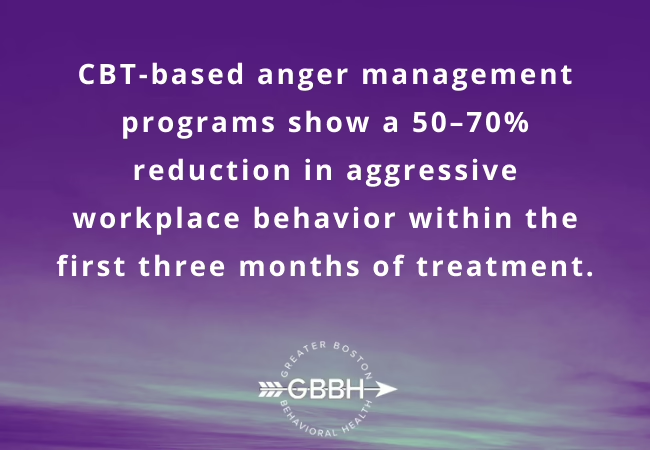In a high-pressure professional world, occasional frustration is inevitable. But when anger escalates unchecked—through sarcasm, silent resentment, explosive outbursts, or passive-aggressive behavior—it does far more than damage your mood. It damages your career.
Managing anger in the workplace is no longer just a “nice-to-have” skill—it’s essential for professional advancement, leadership development, mental well-being, and personal satisfaction.
At Greater Boston Behavioral Health, we offer specialized Anger Management Therapy in Boston and comprehensive Mental Health Programs in Boston designed to help individuals transform destructive anger into strategic emotional intelligence.
Whether you’re struggling quietly or on the brink of professional consequences, therapy can give you the tools to regain control, protect your reputation, and thrive in any workplace.
Why Managing Anger Matters in Your Career
Unchecked workplace anger has real consequences—not just emotionally, but professionally:
Damaged Relationships
Colleagues, supervisors, and clients are less likely to trust, collaborate with, or advocate for individuals who display uncontrolled anger.
Lost Opportunities
Employers value team players who can handle stress. Angry behavior (even if rare) often leads to being overlooked for leadership roles or critical projects.
Increased Isolation
Colleagues may start avoiding you, withholding feedback, or limiting collaboration—further fueling feelings of alienation and resentment.
HR Interventions or Job Loss
Formal complaints, warnings, disciplinary action, and even termination can result if anger escalates to harassment, hostility, or aggressive confrontations.
Internal Consequences
Unchecked anger fuels chronic stress, which can lead to:
- Anxiety and panic attacks
- Depression
- Insomnia and fatigue
- Substance use disorders
- Cardiovascular health risks
Therapy helps you break this destructive cycle—saving not just your career, but your health and sense of purpose.
How Therapy Helps You Manage Anger and Improve Professional Life
At Greater Boston Behavioral Health, we specialize in evidence-based therapies including Cognitive Behavioral Therapy Boston (CBT) and Dialectical Behavior Therapy in Boston (DBT) to address anger at its root.
Here’s how our programs systematically support workplace transformation:
1. Recognizing and Understanding Your Professional Anger Triggers
In therapy, you’ll first work on building emotional awareness—identifying:
- External triggers (e.g., micromanagement, unfair treatment, chaotic leadership)
- Internal triggers (e.g., fear of failure, perfectionism, past workplace trauma)
You’ll learn how seemingly minor frustrations can escalate into disproportionate anger when underlying issues are ignored.
Common professional anger triggers:
- Being unfairly criticized or blamed
- Feeling undervalued or invisible
- Having your autonomy undermined
- Being excluded from decision-making
- Facing unclear expectations and shifting goals
At Greater Boston Behavioral Health: Clients complete trigger logs and anger mapping exercises as part of Mental Therapy Programs in Boston to gain crystal-clear insight into their professional emotional patterns.
2. Interrupting the Anger Cycle Through Emotional Regulation
Recognizing anger is only the first step—you must interrupt escalation before it damages relationships or performance.
We teach:
- Mindfulness micro-practices: Staying grounded in triggering meetings
- Breathing exercises: Reducing physiological arousal in moments of stress
- Cognitive reframing: Shifting from personalizing criticism (“They hate me”) to interpreting it constructively (“They want me to succeed.”)
Techniques practiced daily in Partial Hospitalization Program in Boston (PHP) and Intensive Outpatient Program in Boston (IOP) settings build automatic emotional resilience.
Outcome: You remain calm, thoughtful, and strategic even under pressure.
3. Mastering Assertive, Professional Communication
Many professionals mismanage anger by:
- Bottling frustrations until they explode
- Venting destructively to the wrong people
- Communicating needs passive-aggressively
Therapy teaches healthy, assertive communication:
- Using “I” statements: “I feel concerned about the project timeline—can we clarify deliverables?”
- Setting respectful boundaries: “I’ll need a clear brief before proceeding further.”
- Delivering feedback and disagreement without hostility or sabotage
At Greater Boston Behavioral Health: We conduct role-plays, scripts, and real-world rehearsal exercises tailored to your specific workplace challenges.
4. Healing Deeper Emotional Wounds That Fuel Workplace Anger
Many professionals’ anger at work is rooted in:
- Childhood experiences of invalidation or abandonment
- Trauma from toxic workplaces (e.g., bullying, harassment, discrimination)
- Perfectionistic standards or chronic impostor syndrome
Therapy helps you heal not just the surface behavior, but the underlying emotional pain.
With integrated psychiatric care in Boston, clients needing support for anxiety, PTSD, depression, or bipolar disorder receive diagnostic assessments and medication management when appropriate.
5. Building Emotional Intelligence and Leadership Readiness
Professionals who successfully manage workplace anger often emerge with:
- Greater emotional intelligence (EQ)
- Enhanced conflict resolution skills
- Improved team leadership abilities
- Increased job satisfaction and resilience
- Authentic professional relationships
These skills are not just “nice to have”—they are key to leadership and long-term career advancement.
At Greater Boston Behavioral Health, therapy doesn’t just help you survive a job—it helps you become the person who excels at any job.
Signs You May Need Anger Management Therapy for Work
You might need therapeutic support if:
- You feel easily irritated or overwhelmed by minor work frustrations
- Colleagues avoid collaborating with you
- You’ve received informal feedback about being “difficult” or “intense”
- You ruminate over slights, criticism, or unfairness
- You’ve sent regrettable emails, engaged in shouting matches, or withdrawn emotionally
- You’re worried about escalating to HR intervention or losing your job
- You feel exhausted, anxious, or disconnected from your professional goals
When a Higher Level of Care (IOP, PHP, or Residential) May Be Needed
For mild to moderate anger issues, weekly outpatient therapy may suffice.
However, you may need structured programs like Intensive Outpatient Program in Boston (IOP), Partial Hospitalization Program in Boston (PHP), or Residential Treatment if:
- Anger is deeply embedded with anxiety, trauma, or mood disorders
- You’re facing immediate risk of professional disciplinary action
- Previous outpatient therapy has not led to significant improvement
- Anger episodes are causing crisis-level problems in multiple areas of life
Structured programs provide intensive support for rapid stabilization, skills acquisition, emotional healing, and long-term resilience building.
Real Workplace Scenarios Where Anger Management Therapy Changes Outcomes
Here’s how therapy skills create better outcomes in real-world work situations:
| Before Therapy | After Anger Management Therapy |
|---|---|
| Yelling during a team meeting after perceived criticism | Taking a few deep breaths, reframing the feedback, responding calmly |
| Sending a hostile email in frustration | Saving the draft, regulating emotions, rewriting assertively later |
| Avoiding collaboration due to past resentment | Addressing concerns respectfully and rebuilding professional rapport |
| Escalating minor workplace conflicts into HR complaints | De-escalating tensions early with active listening and solution-seeking |
Therapy transforms reactivity into resilience, ensuring professional reputation remains intact—and relationships grow stronger.
5 Core Emotional Intelligence Skills That Set Great Professionals Apart
Therapy doesn’t just help you manage anger—it builds the emotional intelligence (EQ) essential for professional leadership:
1. Self-Awareness
Understanding your emotional patterns and recognizing anger before it escalates.
2. Self-Regulation
Managing strong emotions constructively without impulsive or destructive behaviors.
3. Empathy
Recognizing and respecting others’ emotional experiences during conflicts or negotiations.
4. Social Skills
Communicating needs clearly, building alliances, resolving conflicts diplomatically.
5. Motivation
Staying focused on long-term professional goals instead of short-term emotional reactions.
At Greater Boston Behavioral Health, these skills are integrated into every level of anger management therapy—building career resilience, personal growth, and leadership potential.
Why Choose Greater Boston Behavioral Health for Workplace Anger Support?
- Expertise in professional-focused anger management therapy
- Specialization in CBT, DBT, trauma therapy, and psychiatric integration
- Full range of services—from outpatient therapy to PHP, IOP, and residential programs
- Personalized treatment planning aligned with professional goals
- Discrete, judgment-free environment for sensitive career and relational concerns
- Holistic focus: mental health, emotional intelligence, and leadership development
Conclusion
Managing anger isn’t about suppressing who you are—it’s about mastering how you show up in your professional life. When you gain control over anger, you unlock the ability to lead with clarity, collaborate with resilience, and handle even the toughest challenges with confidence. At Greater Boston Behavioral Health, we believe that emotional mastery is one of the most powerful career skills you can develop. Our expert team offers evidence-based Anger Management Therapy in Boston, helping professionals not just manage their emotions, but transform their professional lives for the better.
If you’re ready to move beyond frustration, protect your reputation, and build a career rooted in emotional intelligence, leadership, and personal empowerment—we’re here to help you take that next step. At Greater Boston Behavioral Health, we help professionals turn workplace anger into personal empowerment, stronger relationships, and greater career success. Call (888) 278-0716 today to start building the emotional resilience your future deserves.
FAQ on Managing Anger at Work Through Therapy
How does therapy help manage workplace anger?
Therapy helps individuals recognize triggers, regulate emotions, improve communication, and build professional resilience—essential for long-term career growth.
Can anger management therapy prevent career damage?
Absolutely. By learning emotional regulation, assertive communication, and stress tolerance, professionals can protect and even enhance their reputations and leadership potential.
What therapy approaches are used for workplace anger at Greater Boston Behavioral Health?
We use evidence-based approaches including Cognitive Behavioral Therapy (CBT) and Dialectical Behavior Therapy (DBT) to build sustainable emotional regulation and workplace skills.
When should I consider a structured program like IOP or PHP?
Structured programs are recommended if anger has led to serious career risks (HR interventions, job loss threats), or if outpatient therapy hasn’t significantly reduced escalation.
Does Greater Boston Behavioral Health offer psychiatric support for co-occurring issues like anxiety or depression?
Yes. Clients have access to comprehensive psychiatric care in Boston to address underlying mental health conditions impacting anger control.


